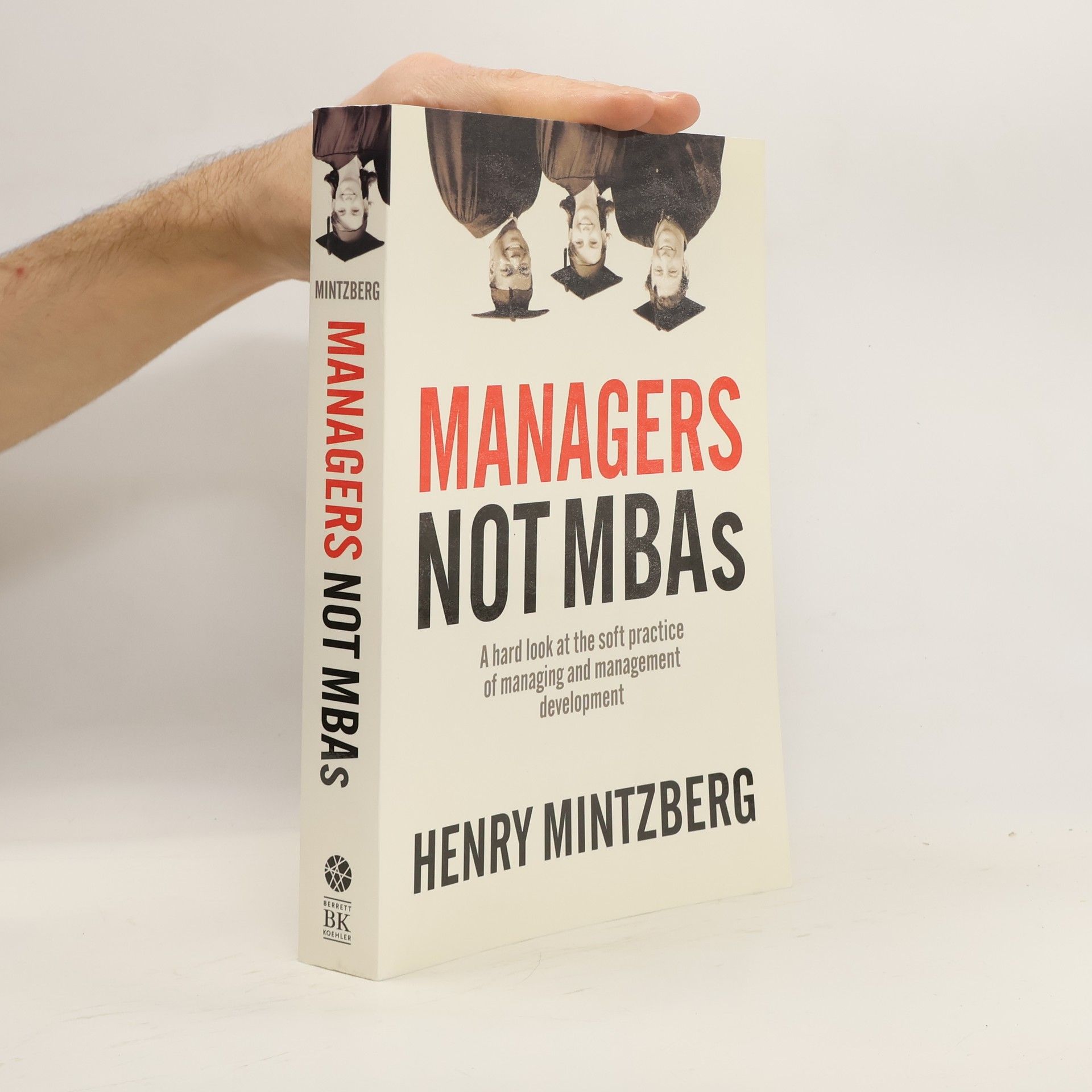Bousculant les idées reçues sur le management et ouvrant de nouvelles perspectives, Mintzberg se propose ici de décrire et interpréter ce que font vraiment les managers au quotidien... et pas seulement dans les entreprises : dans tout type d'organisation. Ce livre est le fruit d'une immersion dans le quotidien de 29 managers, issus de secteurs aussi variés que ceux des affaires, la politique, la santé et le social, exerçant aussi bien dans un camp de réfugiés que dans un orchestre... Donnant sens à la simple réalité concrète et quotidienne de ces hommes et femmes, Mintzberg décrit le management comme une pratique, et non pas comme une science ni une profession, acquise d'abord par l'expérience. Dans Managing, il reprend quelques-unes de ses conclusions antérieures, en reconsidère d'autres, et en introduit de nouvelles. Managing pourrait bien être le livre le plus éclairant sur ce que font les managers, comment ils le font et comment ils pourraient le faire encore mieux.
Henry Mintzberg Livres
Henry Mintzberg est un universitaire et auteur renommé spécialisé dans le management et la stratégie d'entreprise. Son travail examine de manière critique les approches contemporaines de la gestion et de la planification stratégique, soulignant l'importance de l'expérience pratique et de la pensée critique par rapport aux simples méthodes quantitatives. Mintzberg remet en question les modèles traditionnels d'éducation commerciale, plaidant pour des réformes visant à développer de véritables compétences managériales et une compréhension plus approfondie des processus organisationnels. Ses analyses offrent aux lecteurs une perspective rafraîchissante et provocatrice sur le monde du management.






Understanding Organizations--Finally!
- 244pages
- 9 heures de lecture
The iconic Henry Mintzberg provides a crystal-clear map to the seven forces that shape all human organizations, synthesizing sixty years of research on organizational design and theory. Human beings have been organizing to accomplish work for as long as we’ve existed. So why is organizational behavior still so elusive and mysterious? In this book, one of the greatest scholars in his field reframes his career’s work around the seven forces that drive all organizations. Mintzberg identifies them as efficiency, proficiency, consolidation, collaboration, culture, division, and conflict. Each of these forces aligns with one of the seven basic organizational forms: the Personal Enterprise, the Programmed Machine, the Professional Assembly, the Project Pioneer, the Divisional Form, the Community Ship, and the Political Arena. Mintzberg explores how these forms combine and hybridize and offers a life-cycle model to explain how organizations transition between the forms and hybrids. Mintzberg says that organizations are formed by a set of relationships, yet their purpose is achieved only through individual work—making the act of organizing a unique science. This brilliant book not only explains why organizations are the way they are, but it also shows how we can make our individual organizations function at the highest possible level.
Readings and cases are arranged to provide students with a conceptual insight into actual business situations. The book integrates the various strands of the strategy process - strategy itself, strategy analysis, structure, power and culture - and shows how they operate in different businesses - entrepreneurial, innovative, diversified, specialized and established.
Presents methods and examples of organizational structure using empirical literature to describe how organizations structure themselves. The book discusses the nature of managerial work, strategy formation process and issues associated with each type of structure.
A half century ago Peter Drucker put management on the map. Leadership has since pushed it off. Henry Mintzberg aims to restore management to its proper front and center. “We should be seeing managers as leaders.” Mintzberg writes, “and leadership as management practiced well.”This landmark book draws on Mintzberg’s observations of twenty-nine managers, in business, government, health care, and the social sector, working in settings ranging from a refugee camp to a symphony orchestra. What he saw—the pressures, the action, the nuances, the blending—compelled him to describe managing as a practice, not a science or a profession, learned primarily through experience and rooted in context.But context cannot be seen in the usual way. Factors such as national culture and level in hierarchy, even personal style, turn out to have less influence than we have traditionally thought. Mintzberg looks at how to deal with some of the inescapable conundrums of managing, such as, How can you get in deep when there is so much pressure to get things done? How can you manage it when you can’t reliably measure it?This book is vintage iconoclastic, irreverent, carefully researched, myth-breaking. Managing may be the most revealing book yet written about what managers do, how they do it, and how they can do it better.
Strategy Safari
The Complete Guide Through the Wilds of Strategic Management
THE greatest strategy mind blazes a trail through the jungle of strategic fads and fixes. The indispensable guide for the bewildered student.
Structure in Fives
- 312pages
- 11 heures de lecture
Here's a guide that shows managers how to choose the best organizational design for their business from five basic structures identified by the author. In it readers will discover how to avoid typical mistakes, especially those pertaining to conflict among different divisions.
Managers Not MBAs: A Hard Look at the Soft Practice of Managing and Management Development
- 464pages
- 17 heures de lecture
In this sweeping critique of how managers are educated and how, as a consequence, management is practiced, Henry Mintzberg offers thoughtful and controversial ideas for reforming both.“The MBA trains the wrong people in the wrong ways with the wrong consequences,” Mintzberg writes. “Using the classroom to help develop people already practicing management is a fine idea, but pretending to create managers out of people who have never managed is a sham.”Leaders cannot be created in a classroom. They arise in context. But people who already practice management can significantly improve their effectiveness given the opportunity to learn thoughtfully from their own experience. Mintzberg calls for a more engaging approach to managing and a more reflective approach to management education. He also outlines how business schools can become true schools of management.
Rebalancing Society: Radical Renewal Beyond Left, Right, and Center
- 168pages
- 6 heures de lecture
"Our world is out of balance, says Henry Mintzberg, and the consequences are proving fateful: the degradation of our environment, the demise of our democracies, and the denigration of ourselves, with greed having been raised to some sort of high calling. But we can set things right. Mintzberg argues that a healthy society is built on three balanced pillars: a public sector of respected governments, a private sector of responsible enterprises, and what he calls a plural sector of robust voluntary associations (nonprofits, NGOs, etc.)"--Amazon.com
Bedtime Stories for Managers
- 200pages
- 7 heures de lecture
In forty-two succinct, surprising essays, legendary scholar Henry Mintzberg brings management down from the clouds and onto solid ground.If you're like most managers and things keep you up at night, now you can turn to a book that's designed especially for you! But you won't find talking rabbits or princesses here. (There is a cow, but it doesn't jump.) Henry Mintzberg has culled forty-two of the best posts from his widely read blog and turned them into a deceptively light, sneakily serious compendium of sometimes heretical reflections on management.The moral here is managers need to leave their castles and find out what's actually going on in their kingdoms. And like real bedtime stories, these essays have metaphors galore. So prepare to grow strategies like weeds and organize like a cow. Discover the maestro myth of managing, find the soft underbelly of hard data, and learn why downsizing is bloodletting and your board should be a bee. Mintzberg writes, "Just try not to be outraged by anything you read, because some of my most outrageous ideas turn out to be my best. They just take a while to become obvious."



